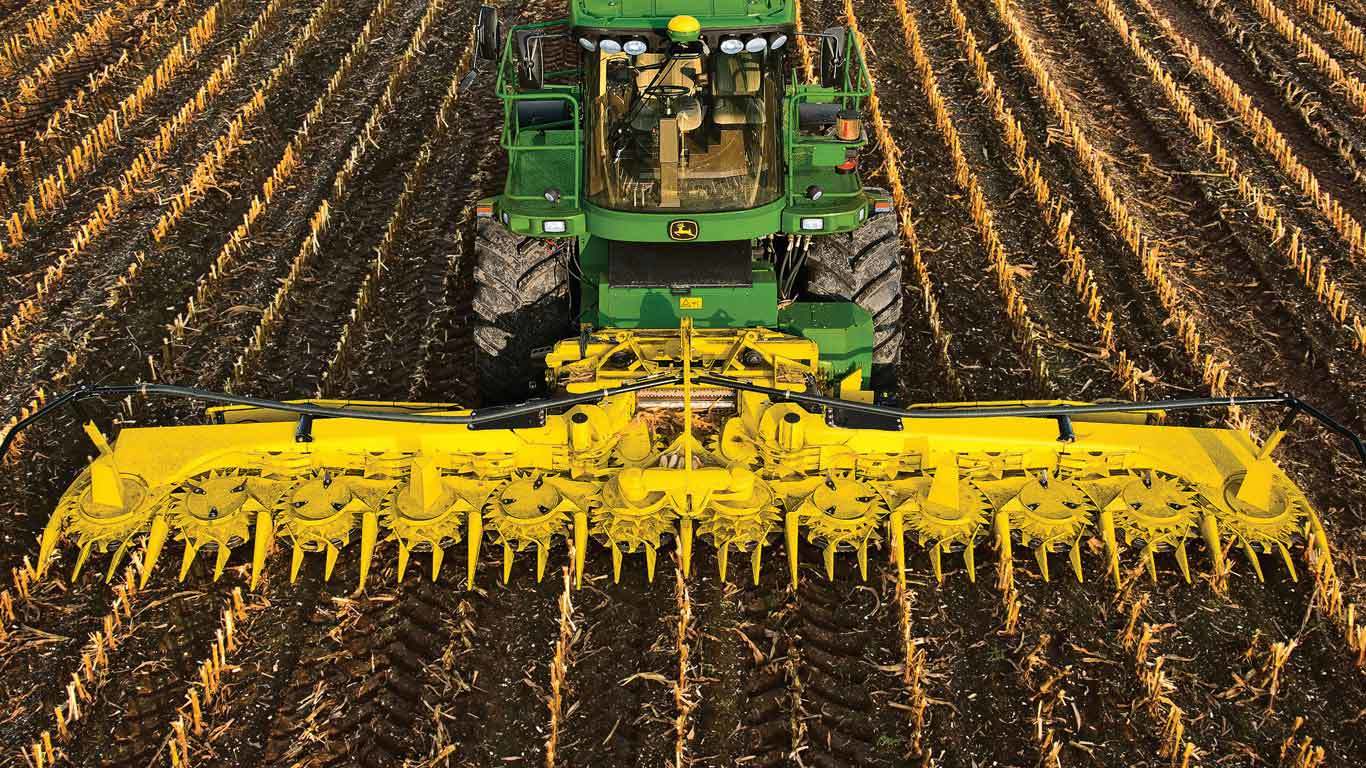
John Deere 692
Rotary Harvesting Unit
- Small drum cutting
- Small drum gathering
- Advanced header-height control
- Row scrapers and cleaners prevent crop building
Features
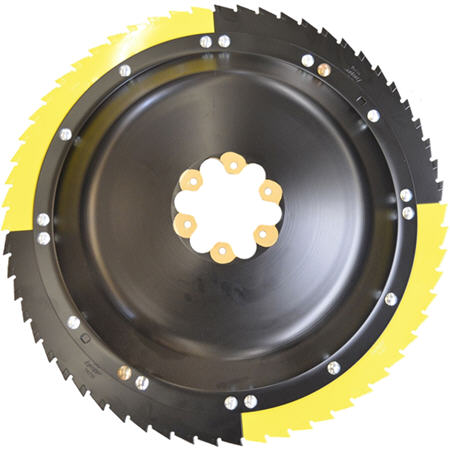 Saw blades with changeable segments
Saw blades with changeable segments
The saw blades of John Deere rotary crop headers cut quickly and thoroughly at a high speed of rotation. As the fast-turning blades cut the full width, crops can be harvested regardless of the row spacing. Thanks to this row-independent harvesting technology, the field can be worked from any side, which is particularly important for down crop.
The fast-turning saw blades allow crops with a lot of weeds to be harvested easily. Besides maize, a wide range of crops such as sorghum, whole crop silage, oilseed, canola, pampas grass, and miscanthus can be harvested.
Key features:
- Fast turning saw blades can cut in difficult harvesting conditions to give the operator increased uptime.
- Headers can be used in various stemmed crops and there is no need for extra headers, which saves on the cost of operation.
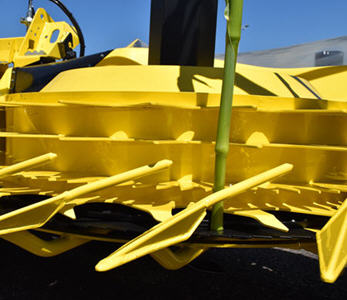 Intake fingers push every plant into the gatherer drum
Intake fingers push every plant into the gatherer drum
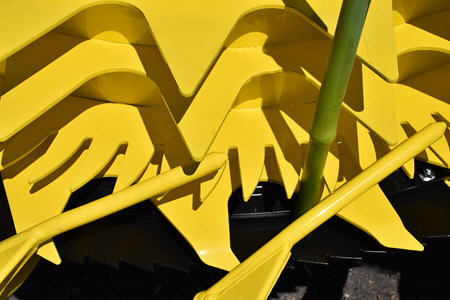 Plant pushed into the gatherer drum
Plant pushed into the gatherer drum
After the fast-rotating blades cut the crop, the intake fingers push the plants into the gatherer drums that rotate in the same direction at low speeds. Every plant is pushed into the teeth of the gatherer drum. The specially designed shape of the teeth ensures that both small and large plants are conveyed in a secure way.
In the machine, the plants are taken off the back of the gatherer drum by scrapers. Depending on the width of the header, they are forwarded to the cross-feed drums or immediately fed into the angled feed drums in the middle of the machine.
Key feature:
- Every plant is individually and securely pushed into the gatherer drum (Performance).
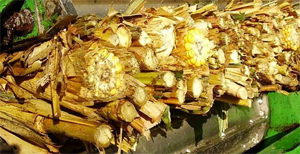 Bundled, lengthwise feeding toward the feed rolls
Bundled, lengthwise feeding toward the feed rolls
Even feeding of the harvested crop bundled lengthwise to the chopper unit of the self-propelled forage harvester (SPFH) is crucial for an even cut. Only even, lengthwise feeding allows for the full use of the power installed on the SPFH.
Benefits:
- Bundling of lengthwise stalks is the basis for perfect cutting.
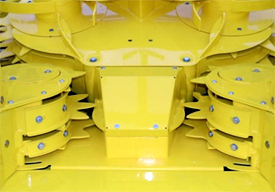 Six row with three rings of teeth-feeding crops to the SPFH
Six row with three rings of teeth-feeding crops to the SPFH
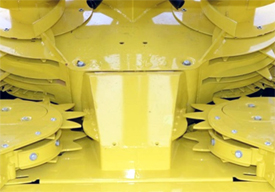 Eight, 10 and 12 row with two rings of teeth-feeding crops to the SPFH
Eight, 10 and 12 row with two rings of teeth-feeding crops to the SPFH
Two angled feed drums push the crop toward the feed rolls of the SPFH. The size of the feed drums depends on the size of the header; the six-row headers feature three rings that push the crop in the feed rolls of the SPFH. The eight-, 10-, and 12-row headers feature a lower version with only two rings.
Benefits:
- The feeding drum size, depending on the working width, provides the necessary space to use 10- and 12-row headers, which allows for the operator to feed larger crop bundles to the SPFH.
With the most recent generation of the small drum headers, leading performance is proven. Due to feed availability pressures, the variety of plants and harvesting conditions becomes more and more challenging. The investment into a special head is expensive. The John Deere small-drum header is a good alternative to harvest a variety of crops.
The most challenging is the optimization of the crop flow in the header. An open construction was the solution. All drum scrapers or holders of divider points are positioned out of the crop flow. An accumulation or blocking of weeds and leaves will be avoided.
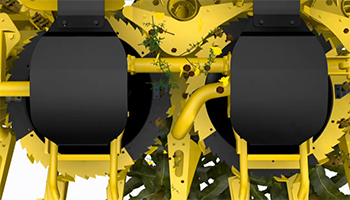 Open design dirt will fall out of the header
Open design dirt will fall out of the header
Benefits:
-
The open design ensures the header is self-cleaning for cleaner silage.
-
The open design is more reliable because dirt does not build up in the header.
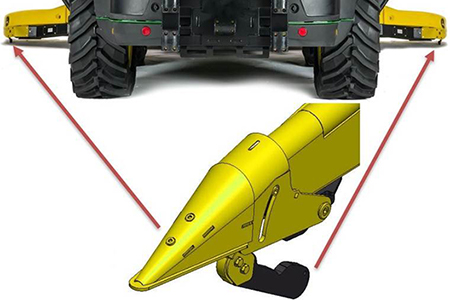 AHC sensors on the header
AHC sensors on the header
The AHC sensors are located at the two outermost points from the header. The sensors continuously scan the ground and adjust the height and inclination of the attachment. This quick adjustment guarantees a constant stubble height.
The AHC sensors are optional equipment for eight- and 10-row machines.
The AHC sensors are base equipment for 12-row machines.
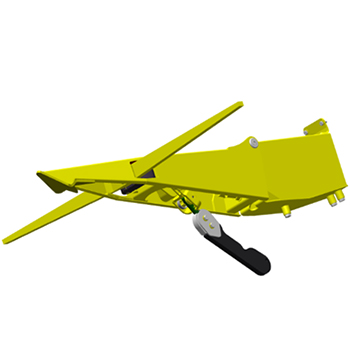 Third height sensor on the header
Third height sensor on the header
The third Advanced Header Control (AHC) sensor and RowSense™ system are base equipment for 12-row machines. The third sensor is built into the long RowSense pointer.
The wide 12-row head follows ground contours better with the extra third signal. This is extremely helpful when cutting close to the ground or when there are plough furrows at the field boundary.
 AHC sensor
AHC sensor
Experience improved ground following with the third AHC sensor, available as a bundle for the middle of the machine.
- Better following of ground contours
- Prevents wide headers from diving into plough furrows, for example
- Less wear
Specs & Compare
Key Specs | 692 Current Model |
| Rotary harvesting unit | Length 1.7 m 5.7 ft Overall width 9.1 m 30 ft Height 1.8 m 6 ft Operating width 9 m 22.5 ft Transport width 3.3 m 10.8 ft Weight 3,970 kg 8,752 lb |
Rotary harvesting unit | |
| Length | 1.7 m 5.7 ft |
| Overall width | 9.1 m 30 ft |
| Height | 1.8 m 6 ft |
| Transport height | |
| Operating width | 9 m 29.5 ft |
| Transport width | 3.3 m 10.8 ft |
| Weight | 3,970 kg 8,752 lb |
Revolution rating calculated with forage harvester at a standstill without load | |
| Engine rpm | |
| Header drive shaft (shift rod pulled out for slow speed) | |
| Gathering drum | |
| Cutting blades for gathering drum | |
| Feed drums | |
| Cross feed drums | |
Additional information | |
| Date collected | 17-January-2018 |

